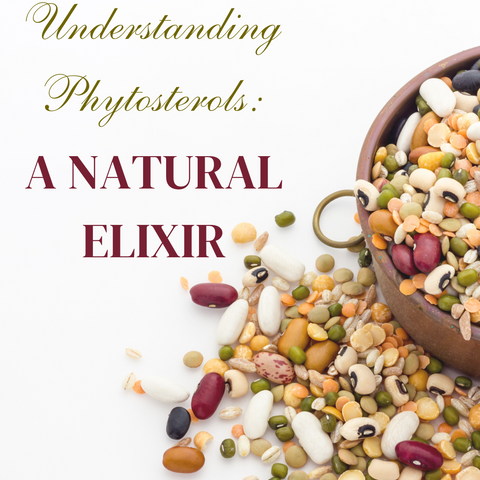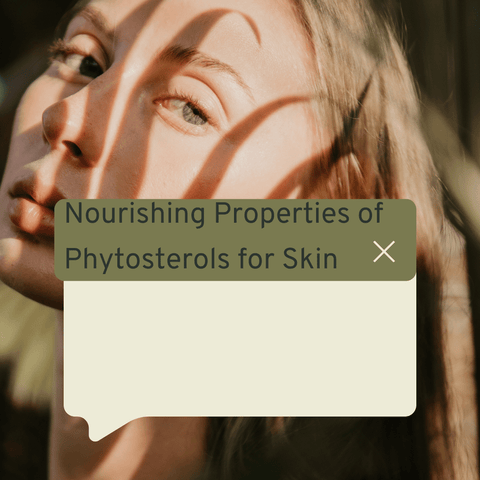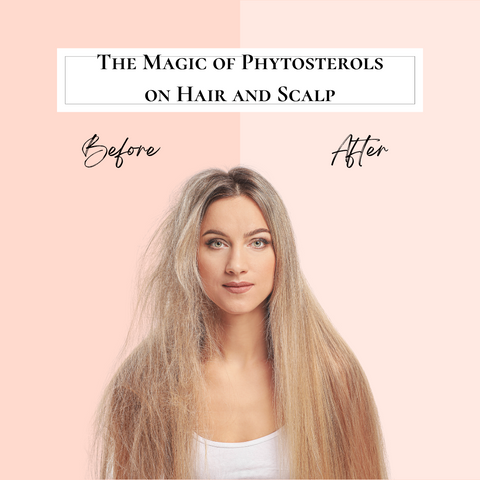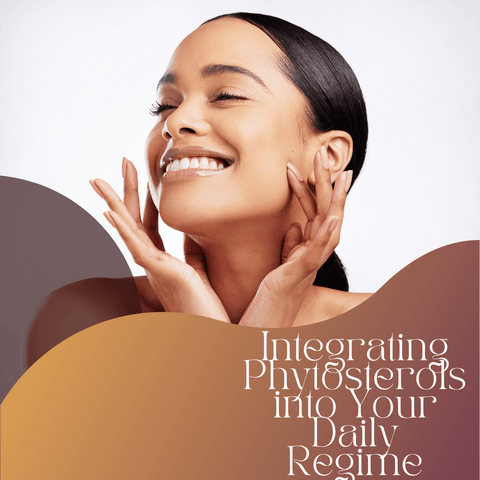Plant sterols, or phytosterols, are naturally occurring substances included in a variety of plant-based diets and oils. They provide several advantages for the health of the skin and hair. This blog will examine how phytosterols can improve the health of your skin and hair.
Understanding Phytosterols: A Natural Elixir

Phytosterols, also called plant sterols, are a class of naturally occurring substances present in a variety of plant-based foods and oils. These substances resemble cholesterol, which is present in foods derived from animals, structurally. The potential health benefits of phytosterols, particularly in enhancing heart health and controlling cholesterol levels, have drawn attention. This blog examines phytosterols in more detail.
The Definition and Origins of Phytosterols
Plants include a class of sterols called phytosterols. They are further divided into more specific molecules, the most prevalent of which are stigmasterol, campesterol, and beta-sitosterol. Although these phytosterols are sometimes referred to as a group, they each have different characteristics. Plants naturally synthesise phytosterols to form part of their cell membranes. In plants, they perform roles akin to those of cholesterol in animals, supporting the preservation of cell membrane fluidity and structural integrity. Plant parts that contain phytosterols include seeds, fruits, nuts, vegetables, and cereals.
Unique Features of Phytosterols
The lipid molecule cholesterol, which resembles phytosterols structurally, is a component of animal cell membranes. Because phytosterols and cholesterol are similar, they can compete with each other for absorption related to digestion, which reduces the absorption of cholesterol from diet. This characteristic also decreases cholesterol. It gives rise to their many types of phytosterols, plant-based sources, natural antioxidants, applications in functional meals, benefits for skincare and haircare, safe, well-tolerated, and environmentally responsible sourcing. In addition, their application in the haircare and cosmetics industries demonstrates their versatility and potential to enhance overall health.
The Science Behind Phytosterols and Skin Health
The science underlying phytosterols' advantageous effects on skin health is based on their special qualities and capacity to target particular skin issues. An overview of the ways in which phytosterols can promote skin health through moisturising and barrier function, anti-inflammatory qualities, UV protection, anti-aging effects, protection from environmental stressors, and skin hydration is provided here, based on scientific theories. Using phytosterols in skincare products—like serums, lotions, and moisturizers—can be a good approach to taking advantage of these scientifically proven advantages. Phytosterols can be administered topically to help with a variety of skin issues, such as inflammation, dryness, ageing, and UV protection. Selecting products from reliable manufacturers that incorporate phytosterols into a thorough skincare routine is crucial.
Nourishing Properties of Phytosterols for Skin

Phytosterols, also known as plant sterols, have nourishing properties for the skin due to their unique structural and chemical properties. These properties can benefit skin health, hydration, and appearance. The following are phytosterols' skin-nourishing properties:
-
Moisturization: Phytosterols have emollient properties, which means they can lock in moisture and help keep skin hydrated. They keep the skin hydrated by preventing water loss from the skin, which reduces dryness and flakiness.
-
Enhancement of the Barrier: Phytosterols uphold the skin's natural protective layer. They strengthen the stratum corneum, the skin's outermost layer, and improve its ability to retain moisture. This barrier function is critical for protecting the skin from external irritants and stressors.
-
Reduced Transepidermal Water Loss (TEWL): By lowering TEWL, phytosterols help to keep skin hydrated. The skin remains moisturised and healthy when it loses less water to the environment.
-
Anti-Inflammatory and Soothing Effects: Phytosterols have anti-inflammatory properties that can help soothe irritated and inflamed skin. This is especially beneficial for people who have sensitive skin or who experience redness and inflammation as a result of various skin conditions.
-
Environmental Stressor Protection: Phytosterols act as a protective shield on the skin's surface, shielding it from environmental stressors such as air pollution, harsh weather, and UV radiation. This protection helps to prevent skin damage and premature aging.
-
Enhanced Skin Elasticity: Phytosterols have been shown to promote the synthesis of collagen and elastin, two important proteins responsible for skin elasticity. This property can result in firmer, more youthful-looking skin.
-
Anti-Aging Properties: The ability of phytosterols to reduce oxidative stress and protect against UV damage contributes to their anti-aging properties. They can aid in the prevention of wrinkles, fine lines, and other signs of aging.
-
Soothing Dry Skin: Phytosterols can relieve the dryness and discomfort associated with dry skin conditions. They help prevent flakiness and tightness associated with dry skin by maintaining hydration levels and supporting the skin's barrier function.
-
Overall Skin Health: Phytosterols nourish the skin from within by promoting its health and well-being. This, in turn, results in a more radiant and glowing complexion.
Consider using phytosterol-containing skincare products, such as moisturisers, serums, and creams, to benefit from the skin-nourishing properties of phytosterols. These products can help with a variety of skin issues, including dryness and irritation, as well as anti-aging and UV protection. Choose skincare products from reputable brands that are known for their quality and effectiveness in delivering phytosterols' nourishing benefits to your skin.
Enhancing Skin Elasticity and Hydration
Maintaining healthy, youthful-looking skin requires improving skin elasticity and hydration. Consider incorporating the following practises into your skincare routine to achieve this:
-
Hydrate from Within: Keep your body and skin hydrated from the inside out by drinking plenty of water throughout the day.
-
Moisturise on a regular basis: Use a high-quality moisturiser that is appropriate for your skin type. Look for hydrating ingredients such as hyaluronic acid, glycerin, and ceramides in products.
-
Cleaning: Use a gentle cleanser to remove dirt and makeup without stripping your skin of its natural oils.
-
Exfoliation: Exfoliate your skin on a regular basis to remove dead skin cells and promote cell turnover. This can help moisturisers absorb better.
-
Sun Protection: Use a broad-spectrum sunscreen on a daily basis to protect your skin from UV damage, which can cause dryness and elasticity loss.
-
Phytosterols: Look for phytosterol-containing skincare products, which can improve skin elasticity and moisture retention. Phytosterols aid in the strengthening of the skin's barrier and the retention of moisture.
-
Humectants: Humectants, such as glycerin and hyaluronic acid, attract and retain moisture in the skin.
-
Antioxidants: Products high in antioxidants, such as vitamins C and E, can help protect the skin from oxidative stress and keep it looking healthy.
-
Diet: Eat a diet high in fruits, vegetables, and healthy fats, as these can provide essential nutrients for skin health. Omega-3 fatty acids, which can be found in fatty fish and flaxseeds, can help with skin hydration.
-
Avoid Harsh Skincare Products: Avoid using harsh skincare products that can strip the skin of its natural oils, resulting in dryness and decreased elasticity.
-
Topical Retinoids: Use retinoid-based products to improve skin elasticity by stimulating collagen production.
-
Hydration Masks: Use hydrating masks once or twice a week to boost moisture levels in the skin. Look for masks that contain aloe vera, hyaluronic acid, or ceramides.
-
Anti-Aging Serums: Include anti-aging serums with peptides and growth factors to help with collagen production and skin firmness.
-
Lifestyle Habits: Maintain a healthy lifestyle by getting enough sleep, managing stress, and avoiding smoking and excessive alcohol consumption, as these factors can have an impact on skin health.
-
Consult a Dermatologist: If you have specific concerns about skin elasticity or hydration, or if you are thinking about more advanced treatments, see a dermatologist for personalised advice and potential medical procedures.
Fighting Against Aging: A Natural Approach
Fighting the signs of aging naturally can be accomplished through a combination of healthy lifestyle choices, skincare practises, and dietary habits. Here's a comprehensive guide to combating the effects of ageing naturally:
-
Sun Protection: UV rays are a major cause of premature ageing. Always use broad-spectrum sunscreen to protect your skin from harmful UV rays.
-
Hydration: Proper hydration is essential for maintaining youthful skin. Drink plenty of water every day to keep your skin hydrated from the inside out.
-
Balanced Diet: Consume a diet high in fruits, vegetables, and antioxidant-rich foods like berries, leafy greens, and nuts. These foods can help fight free radicals and promote skin health.
-
Omega-3 Fatty Acids: Include omega-3 fatty acid sources like fatty fish (salmon, mackerel), flaxseeds, and walnuts in your diet. Omega-3 fatty acids promote skin hydration and flexibility.
-
Antioxidant-Rich Skincare: Use antioxidant-rich skincare products like vitamin C and E to protect your skin from oxidative stress and reduce the signs of aging.
-
Natural Exfoliation: Exfoliate your skin on a regular basis to remove dead skin cells and boost cell turnover. Consider using natural exfoliants such as sugar, oats, or a soft bristle brush.
-
Retinoids: Retinoids (vitamin A derivatives) are well-known for increasing collagen production and improving skin texture. They can be found topically or in natural sources such as rosehip oil.
-
Hydrating Ingredients: Look for hydrating natural ingredients in your skincare products, such as hyaluronic acid, aloe vera, and ceramides.
-
Gentle Cleansing: To remove dirt and makeup without stripping your skin of its natural oils, use a gentle, natural cleanser.
-
Sleep and Stress Management: Ensure that you get enough quality sleep and that you manage stress using relaxation techniques such as meditation or yoga.
-
Natural Moisturisers: Use natural oils like jojoba, argan, or coconut oil as moisturisers to keep your skin hydrated.
-
Plant-Based Antioxidant Serums: To combat the signs of ageing, consider using plant-based antioxidant serums containing ingredients such as green tea, pomegranate, and resveratrol.
-
Physical Activity: The skin receives vital nutrients from improved blood circulation, which helps maintain a healthy complexion.
-
Avoid Smoking and Excessive Alcohol Consumption: Smoking and excessive alcohol consumption can hasten ageing. Avoiding these habits can help you keep your skin looking young.
-
Consult with a dermatologist: If you have specific ageing concerns or are considering more advanced treatments, consult a dermatologist for personalised recommendations and potential medical procedures.
-
Mindful Skincare Choices: Invest in skincare products from reputable brands that prioritise natural and sustainable ingredients and manufacturing practises.
Protective Measures: Shielding Skin from Damage
Keeping your skin healthy, vibrant, and youthful-looking requires protecting it from harm. These are some of the most important ways to protect your skin from damage: wear sun protection clothing, seek shade, stay hydrated, eat a diet high in antioxidants, use natural skincare products, gently cleanse, exfoliate, hydrate and moisturise, use anti-inflammatory skincare products, avoid smoking and excessive alcohol use, manage your stress and sleep, engage in physical activity, see a dermatologist, and make thoughtful skincare decisions. You can protect your skin from harm, preserve its health and youthful appearance, and lower your chance of developing skin disorders and premature ageing by adhering to these preventative steps.
The Magic of Phytosterols on Hair and Scalp

Plant-derived compounds known as phytosterols have several advantages for hair and scalp health. These natural ingredients can do wonders for your hair and scalp, addressing a variety of issues and promoting overall hair vitality. Here are some ways phytosterols can help your hair and scalp:
-
Scalp Nourishment: Phytosterols have moisturising properties that can help relieve itchy, dry scalps. They provide hydration for the scalp, reducing the discomfort associated with dryness and flakiness.
-
Anti-Inflammatory Effects: Phytosterols have anti-inflammatory properties that can help with scalp conditions like dandruff, psoriasis, and seborrheic dermatitis. They help to reduce inflammation and redness.
-
Moisture Retention in the Hair: Phytosterols have the ability to lock in moisture within the hair shaft, preventing dryness and promoting softness and shine. This is especially beneficial for people who have dry or damaged hair.
-
Hair Strength: Phytosterols strengthen and elastinate the hair shaft, lowering the risk of breakage and split ends. This is essential for maintaining strong, healthy hair.
-
Scalp Health: A healthy scalp is essential for healthy hair growth. Phytosterols promote scalp health by reducing inflammation and preserving the skin's barrier, which is essential for avoiding problems like dandruff.
-
Hair Growth Promotion: Some research suggests that phytosterols may promote hair growth by improving the health of hair follicles and the scalp. This can help to make your hair thicker and fuller.
-
UV Protection: Phytosterols can help protect the hair from UV damage, which can cause dryness, colour fading, and other problems. This is especially beneficial for keeping the vibrancy of coloured or treated hair.
-
Natural Shine and Smoothness: Phytosterols improve the look of hair by adding natural shine and smoothness. They can make hair look healthier and shinier.
-
Suitable for All Hair Types: Phytosterols are adaptable and work well on hair that is textured, wavy, curly, or straight. You can incorporate them into your haircare routine as they are generally well-tolerated.
-
Items containing phytosterols: Look for phytosterol-containing haircare products such as shampoos, conditioners, hair masks, and serums. These products can provide phytosterol benefits to your hair and scalp.
-
Natural Oils: Some natural oils, such as shea butter and avocado oil, are naturally high in phytosterols. These oils can be applied directly to the hair and scalp for additional benefits.
-
Consistency is Key: To see significant improvements in your hair and scalp health, use phytosterol-containing products on a consistent and long-term basis.
Phytosterols are a natural and effective way to treat a variety of hair and scalp issues while also improving overall hair health. Whether you have a dry, itchy scalp, want to strengthen your hair, or simply want to improve the appearance of your hair, phytosterols can improve the health and vitality of your hair and scalp.
Addressing Scalp Concerns with Phytosterols
Natural substances generated from plants called phytosterols have the potential to improve scalp health and address a range of scalp issues. The following are some common scalp conditions that phytosterols can assist with dandruff, psoriasis, and eczema; seborrheic dermatitis; dry and itchy scalp; hair follicle health; hydration of the scalp; maintenance of scalp health; suitability for different types of scalp; topical products; and consistency, which is vital. Their nourishing and soothing effects on the scalp can aid in producing a healthier, more pleasant scalp and stronger, brighter hair as a result of their moisturising and anti-inflammatory characteristics.
Promoting Strong and Healthy Hair
A balanced diet, a healthy lifestyle, and proper haircare techniques are all important for promoting strong and healthy hair. Proper nutrition, hydration, a healthy scalp, gentle hair care, and hair protection are some ideas to help you create and keep strong, vivid hair. regular hair cutting, organic hair oils, scalp massages, supplements that are good for hair, phytosterols, stress reduction, abstaining from alcohol and tobacco, protective hairstyles, getting enough sleep, and seeing a professional You may have vibrant and robust hair by taking good care of it and feeding it from the inside out with a healthy diet.
Phytosterols as a Solution to Hair Loss
Plant-derived substances called phytosterols may be helpful in treating some types of hair loss. They can improve hair health and promote general hair development, but they are not a cure-all for all forms of hair loss. Phytosterols may help with hair loss in the following ways:
-
Scalp Health: Phytosterols have moisturising and anti-inflammatory properties that can benefit the scalp. A healthy scalp is essential for hair growth, and phytosterols can indirectly support hair growth by maintaining scalp health.
-
Hydration and moisture retention: Phytosterols assist in the retention of moisture within the hair shaft. Hair that is properly hydrated is less prone to breakage and damage, resulting in healthier hair growth.
-
Strengthening the Hair Shaft: Phytosterols may improve the strength and elasticity of the hair shaft, lowering the risk of breakage and split ends. This can help to make your hair thicker and more resilient.
-
Hair Follicle Health: Phytosterols may benefit hair follicle health, which is essential for healthy hair growth. They indirectly promote stronger and more vibrant hair by creating a healthier scalp environment.
-
UV Protection: UV radiation can cause hair damage and loss. Phytosterols can help protect the hair from UV damage, which is especially important for keeping coloured or treated hair vibrant.
-
The importance of consistency: To reap the benefits of phytosterols for hair growth, use phytosterol-containing haircare products on a regular basis.
-
Complementary to Other Treatments: Phytosterols can be used in conjunction with other hair loss treatments, such as minoxidil or medications prescribed by a doctor.
It is important to note that the effectiveness of phytosterols in treating hair loss varies from person to person, and results may take time to show. Furthermore, hair loss can be caused by a variety of factors, including genetics, hormonal imbalances, and other medical conditions. As a result, if you are experiencing significant or persistent hair loss, you should see a healthcare professional or dermatologist to determine the underlying cause and receive personalised treatment recommendations.
Integrating Phytosterols into Your Daily Regime

Integrating phytosterols into your daily skincare and haircare routine can help you reap their benefits for healthier skin and hair. Here's how to properly incorporate phytosterols:
-
Cleansers, toners, serums, moisturiser, sunscreens, and night creams are all part of a good skincare routine.
-
Shampoo, conditioner, a hair mask, and leave-in products are all part of a good haircare routine.
-
The key to reaping the benefits of phytosterols is consistency. Use these products on a daily basis or as directed for your skin and hair type.
-
If you have specific skin or hair concerns or conditions, consult a dermatologist or trichologist for personalised advice on incorporating phytosterols into your routine.
-
Before using any new skincare or haircare product, a patch test should be performed to check for any adverse reactions or allergies.
Remember that results may vary depending on individual skin and hair types, so choose phytosterol products that are right for you. By promoting moisture retention, strengthening the skin barrier, and protecting against environmental stressors, incorporating phytosterols into your daily skincare and haircare routine can help you achieve healthier, more vibrant skin and hair.
Choosing the Right Phytosterol Products
To fully benefit from phytosterols, you must choose the appropriate products for your skincare and haircare needs. Determine your specific needs, review ingredient lists, choose trustworthy brands, take into account product form, skin and hair type, sunscreen, avoid irritating ingredients, conduct a patch test, seek professional advice, consistency is important, look at customer reviews, and use natural and sustainable ingredients are some suggestions to help you choose the right phytosterol products. You may benefit from phytosterols' benefits for healthier, more vibrant skin and hair by picking the appropriate products that fit your unique needs and tastes.
Tips and Precautions for Phytosterol Usage
Using phytosterol-based products on your skin and hair can be beneficial, but it is critical to do so safely and effectively. When using phytosterols, keep the following tips and precautions in mind:
Tips:
-
Patch Test: Perform a patch test before using any new phytosterol-containing skincare or haircare product. Apply a small amount to a small, inconspicuous area of skin to test for any adverse reactions or allergies.
-
Choose Appropriate Products: Choose phytosterol-containing products that are appropriate for your skin and hair type. There may be products designed for dry skin, oily skin, fine hair, coarse hair, or sensitive skin.
-
Read Ingredient Lists: Look over product ingredient lists to make sure that plant-derived sterols, like stigmasterol, campesterol, and beta-sitosterol, are listed as significant ingredients.
-
Consult a Professional: You might want to consider consulting a dermatologist or trichologist if you have underlying skin or hair issues or conditions. They can offer tailored advice on how to use products containing phytosterols.
-
Use Consistently: Use phytosterol products consistently in accordance with the supplied instructions for the best outcomes. It may take some time to see noticeable improvements, so be patient and stick to your routine.
-
Protect from UV Exposure: If you use phytosterol-based skincare products during the day, pair them with sunscreen for added UV protection.
-
Reputable Brands: Select items from trustworthy skincare and haircare companies with a track record for high-quality, well-performing formulas. You can make well-informed decisions by reading reviews and asking for recommendations.
Precautions:
-
Allergic Reactions: While phytosterols are generally well tolerated, some people may be sensitive or allergic to them. If you have any negative reactions, stop using the product and consult a doctor.
-
Patch test: Before using a new phytosterol product, always conduct a patch test, especially if you have sensitive skin or a history of allergies.
-
Irritating Ingredients: If you have sensitive skin, especially, make sure the product's ingredient list excludes any potentially irritating ingredients like artificial colours, fragrances, or harsh chemicals.
-
Consult a Professional: See a dermatologist or trichologist for advice if you have a history of skin or hair disorders or if you have severe adverse reactions.
-
Avoiding Ingestion: Phytosterol products should only be applied topically. Keep them out of the reach of children and do not ingest them.
-
Store Properly: Follow the storage instructions on the product's packaging to ensure the product's effectiveness and safety.
-
Sunscreen and Sun Protection: When using products during the day, it is critical to use sunscreen to protect your skin from UV damage.
Phytosterols can be an excellent addition to your skincare and haircare routine, providing skin and hair health benefits. By following these guidelines and precautions, you can use phytosterol-based products safely and effectively while reaping the benefits they provide.
Creating a Balanced Skincare and Haircare Routine with Phytosterols
Creating a balanced skincare and haircare routine that includes phytosterols entails selecting the right products and using them correctly. Here's a step-by-step guide to creating a comprehensive routine:
-
Cleanser, toner, serum, moisturiser, and sunscreen are all included in the morning skincare routine.
-
Makeup removal, cleanser, toner, serum, and night cream are all part of the evening skincare routine.
-
Shampoo, conditioner, hair mask, and leave-in products are all part of a good haircare routine.
-
Exfoliation, eye cream, consistency, consulting a professional, and patch testing are some additional tips.
Including phytosterols in a well-balanced skincare and haircare routine can improve skin and hair health by providing hydration, protection, and nourishment. By tailoring your routine to your specific needs and consistently using phytosterol-based products, you can reap the benefits of these natural compounds for both your skin and hair.
































